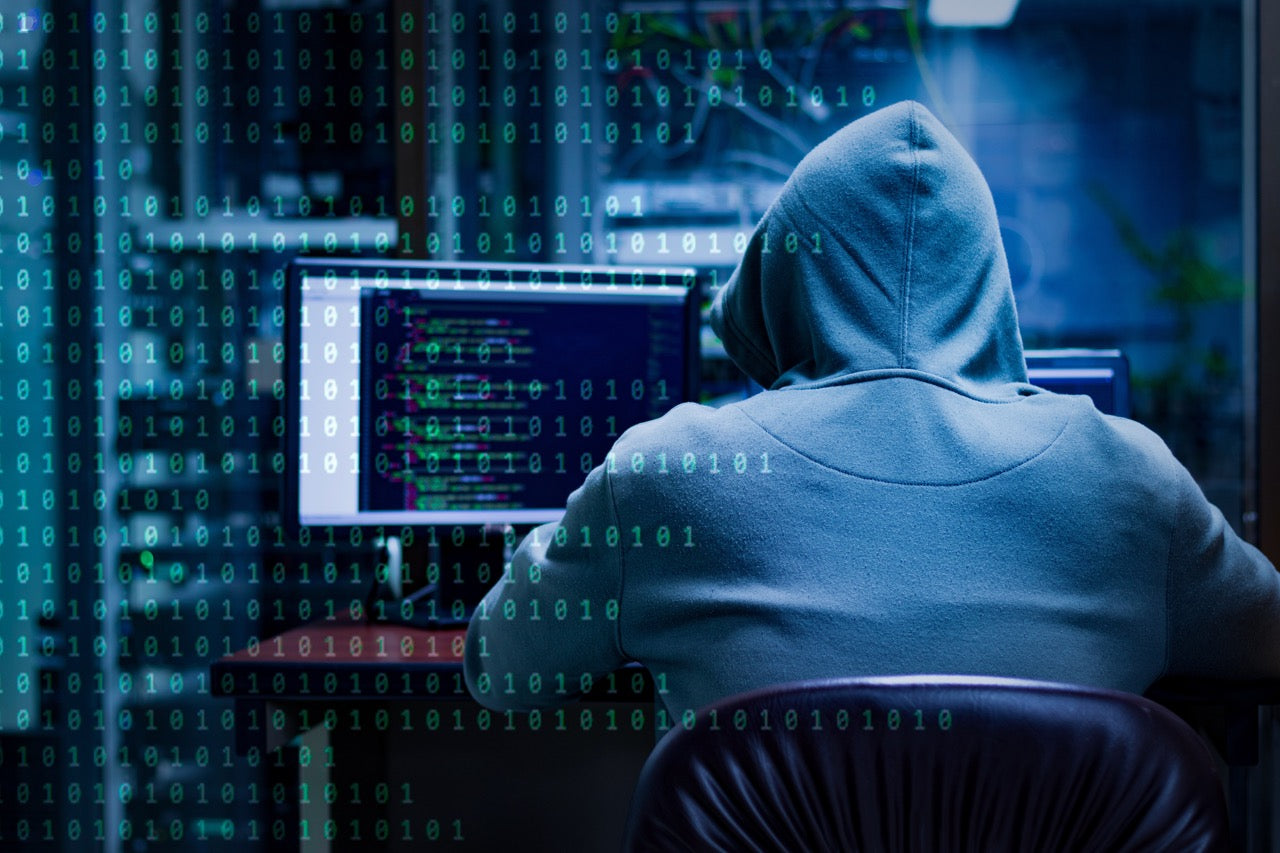
Have you been a victim of a cyber attack?
Does someone external have access to your network, a device or your accounts? We help you.
First aid measures if you have become a victim of a hacker attack
-
1. Preserve evidence
When a cyber attack has occurred, there is usually great panic. That's why it's important that you keep a cool head above all else.
Next, secure any evidence that led you to believe it was hacked.
In order to successfully defend against claims, file criminal charges and for further investigations, it is very important to secure all indicators and evidence that indicate data theft, identity abuse or other cyber attacks.
Take screenshots, scans and photos, back up emails. When taking screenshots, always make sure that there is a date, e.g. B. the Windows clock is shown as a time stamp. Account receipts, emails, lists of credentials that were active up to the day of the incident - all can be valuable evidence that can be accessed later.
Do not delete any evidence, images or documents without first being advised! This also applies if the content may be unpleasant or discrediting for the person concerned. Every clue counts! -
2. Change all passwords
As soon as you are sure that an intruder has been or is active in your data and systems, change all passwords immediately. There is no exception here. Go through all accounts and change your logins with a different password for each account. You automatically check whether the login still works for all accounts. If necessary, request a new password and then change it immediately.
In order, start with your email accounts, then bank accounts and other payment service providers, then e.g. B. Shopping or booking platforms in which your credit card details or bank details are stored as a means of payment. Gradually work your way through all accounts and logins.
Important: A secure password has at least 8 characters consisting of upper and lower case letters, numbers and special characters. If you want to simplify things, use a secure password manager with a corresponding master password. -
3. Inform banks and block credit cards
Unknown debits, unsolicited text messages on cell phones or access to mailboxes and shopping accounts can mean that perpetrators are misusing bank or credit card data. In these and other cases of doubt, you should have your bank accounts, bank cards and credit cards blocked immediately by calling your credit institution or using the emergency blocking number . Lockdown emergency number: 116 116
-
4. Contact Schufa
Register as a victim of identity fraud with Schufa AG . You will then receive confirmation of this from Schufa AG. Save this information and make copies of it. With reference to this confirmation, you can try to defend yourself (without a lawyer) against unjustified claims or debt collection letters.
After receiving the data copies, you should check whether there are any entries or credit inquiries that you did not initiate. Such entries can have a negative impact on the Schufa score and permanently damage your creditworthiness. If incorrect entries are made, Schufa usually refers you to its paid customer service. However, Schufa is obliged to delete false entries free of charge .
-
5. File a criminal complaint
Have credit card details been misused or have your bank details been used for crimes? Were there any unauthorized debits? React immediately and file a criminal complaint. This can be done at any police station. You should have the following documents with you to file a criminal complaint:
- Identity documents
- Details of personal data or cards that may have been misused: email addresses, mobile phone numbers, credit card or bank details
- Printed evidence of crimes, e.g. account receipts, screenshots, emails
- Chronological information: What happened to whom and when? Who could be the perpetrator?
- Report from an IT forensic expert (if available)
-
6. Call in IT forensics experts
Have you been a victim of identity abuse on a “large scale”? As a business owner or CEO, have you fallen victim to identity abuse or CEO fraud? In these cases, it is advisable to call in professional investigators immediately. IT forensic experts specialize in tracking down perpetrators on the Internet. The criminal police, possibly your insurance company, your IT security service provider or data protection officer can use their valuable findings to help contain the damage and preventively protect you from further dangers.
Hacked, what to do?
We understand the urgency and complexity of dealing with hacker attacks. Our team of cybersecurity experts is ready to support you in your time of need. We offer fast and efficient solutions for your business and are just a message or call away.
How to reach us:
Rely on maximum security through prevention
Permanent 24/7 human monitoring of networks is an important part of a comprehensive security strategy. Although technologies such as backup and endpoint security software can be helpful in detecting and blocking known threats, there are still many unknown threats that require humans to detect.

Hacked, what to do?
Recognize
When a system is hacked , the attacker may attempt to run malicious programs on the system masquerading as legitimate processes in order to remain undetected. For example, by monitoring memory and CPU, our RMM system allows us to identify suspicious processes that may be run by an attacker, as these typically have higher resource requirements than legitimate processes. As part of comprehensive cyber defense, this also helps to detect anomalies in systems and respond to potential attacks.

Hacked, what to do?
Prevention
Our RMM system is used to automate processes such as: B. Software updates, backups and system maintenance are used. The so-called patch management. There are several reasons for using patch management. This plays a key role in the area of cyber defense for the following reason: Patches are usually provided to fix security gaps in the software. Installing patches closes known vulnerabilities before hackers can exploit them to access the system or carry out malicious activities.

Hacked, what to do?
24-hour support
Our RMM system includes its own software, which is installed on each system that is to be monitored. You or your staff can use this software to open a support ticket at any time. This ticket will be immediately forwarded to our 24/7 remote monitoring team. Depending on the priority you can set, we respond either immediately or within 2, 4 or 6 hours. If you take a system with you on business trips, for example, this function is available to you everywhere and worldwide. With our RMM system, with your express permission, we can also access your system remotely and support you directly if you have any problems.
In recent years, the number of hacker attacks worldwide has risen sharply, causing disruption, financial loss and data loss to individuals, businesses and governments alike.
The Rising Tide of Hacker Attacks: The Factors Behind the Rise
The prevalence of cybercrime has become a global problem, which led us to examine the factors underlying this alarming rise. We look at the reasons behind the increase in hacker attacks and highlight the evolving cyber landscape and the challenges we face in our age.
The growing digital footprint
The digital transformation of our society has led to an ever larger digital footprint. With the proliferation of internet-connected devices and growing reliance on technology, the attack surface for hackers has increased. From smartphones and laptops to smart homes and critical infrastructure, every connected device becomes a potential target. The sheer number of vulnerable entry points has given hackers more opportunities to exploit vulnerabilities.
Sophisticated cybercrime tools
The tools available to cybercriminals have increased in complexity and sophistication. Dark web marketplaces offer a wide range of hacking tools, ransomware-as-a-service platforms and exploit kits that can be easily purchased for malicious purposes. The emergence of anonymous cryptocurrencies has made it easier for hackers to fund their attacks, further incentivizing their activities. The accessibility of advanced hacking techniques has lowered the barrier to entry for aspiring cybercriminals.
Rising political cyberattacks
State-sponsored hacking has become a growing problem. Nation states are increasingly using their cyber capabilities to attack rival nations, steal intellectual property, conduct espionage and disrupt critical infrastructure. These attacks often involve advanced persistent threats (APTs) and zero-day exploits that are extremely sophisticated and difficult to detect.
Monetization and financial gain
Financial motivation continues to be an important driver of hacker attacks. Cybercriminals are attracted to the lucrative potential of hacking activities, including data breaches, ransomware attacks and identity theft. The emergence of anonymous digital currencies like Bitcoin has made it easier for criminals to make financial gains without leaving a trace. The financial rewards coupled with the perception of low risk and high reward continue to attract individuals and organized criminal networks into cybercrime.
Inadequate cybersecurity measures
Despite the increasing threat landscape, many individuals, companies and organizations still do not have robust cybersecurity measures in place. Poor password practices, unpatched software vulnerabilities, and inadequate employee training create vulnerabilities that hackers can exploit. Small and medium-sized businesses (SMBs) in particular often struggle to allocate sufficient cybersecurity resources, making them attractive targets for cybercriminals looking for easier entry points.
Social engineering and phishing attacks
Social engineering techniques such as Some methods, such as phishing, are still very effective for hackers. By exploiting human psychology and trust, cybercriminals trick people into revealing sensitive information or unknowingly installing malware. With the rise of social media and the wealth of personal information available online, hackers have ample resources to develop sophisticated and convincing phishing attacks.
Lack of international cooperation and legislation
Cybercrime knows no borders, but the lack of global cooperation and uniform legislation hampers efforts to effectively combat hacker attacks. Cybercriminals can operate from jurisdictions with lax regulations, making it difficult to bring them to justice. The lack of a unified international framework for preventing and prosecuting cybercrime creates a favorable environment for hackers to operate freely.
Conclusion
The increase in hacker attacks is due to a combination of factors, including our growing digital presence, the sophistication of cybercrime tools, the involvement of nation states, financial motivations, inadequate cybersecurity measures, social engineering techniques and a lack of international cooperation. To address this escalating threat, individuals, organizations and governments must prioritize cybersecurity, invest in advanced defenses and promote international cooperation. Only through collective efforts can we hope to mitigate risks and protect ourselves in the increasingly connected digital world.

No more fear of cyber attacks

Protect your business
Talk to our experts and find out what you can do in the event of a cyber attack.
